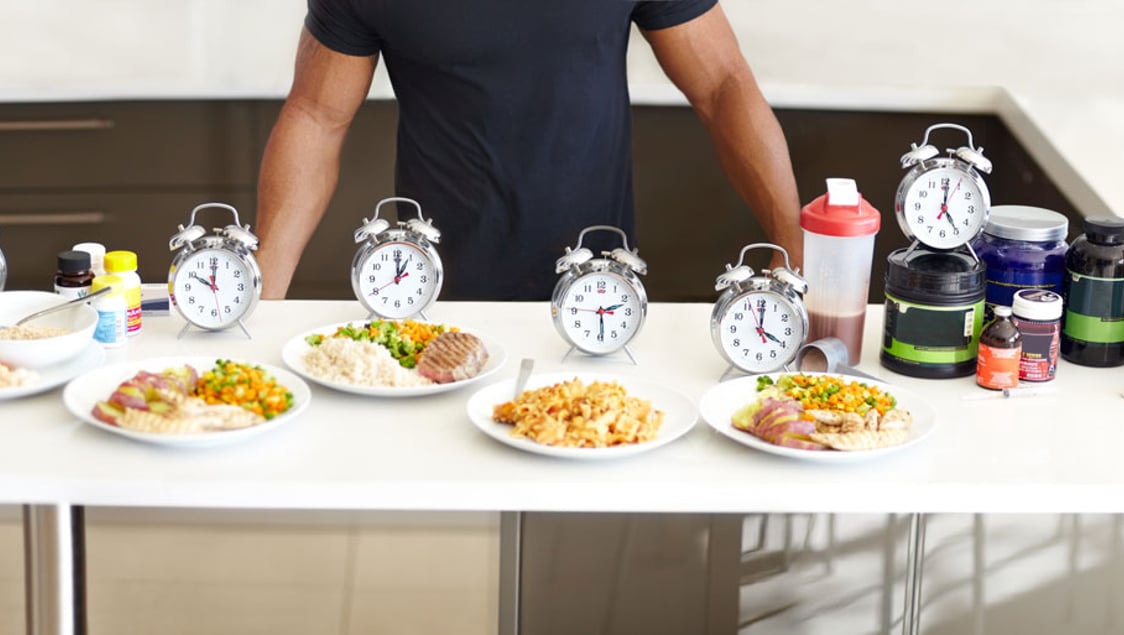
Issue 202
February 2024
Saying no to food may be the secret to enhanced recovery and reduced inflammation because skipping meals isn't just for weight cuts but a strategic move for long-term health, muscle gain, and peak performance.
Regardless of weight division, most fighters will never miss two things. A workout. A meal. Few things can stop them from refuelling after training. And why wouldn’t they? MMA fighters have some of the world’s highest exercise loads, regularly training 2-4 sessions daily. Food is a significant factor in a successful recovery, especially in and around training. Predictably, former heavyweights like Alistair Overeem are very capable of deleting calories, as he said in a famous interview when he was at peak size. “I eat 6,7, maybe 8 times a day. I like beef. Beef is good for strength. Cow beef, horse beef, I like fish. Horse is a very good protein, better than beef.” For Overeem, this monstrous eating pattern is thought to have led to underlying health issues, possibly caused by parasites, and he turned vegetarian. MMA’s relationship with food can be troubled, with Paddy Pimblett and Paul Felder both admitting to having eating disorders. However, there may be a better way with food, and former MMA greats like Georges St-Pierre are choosing to keep their mouth shut.
KEEP YOUR MOUTH SHUT
George St-Pierre is always a name thrown about in the GOAT discussion, but after the Bisping bout, he was diagnosed with ulcerative colitis. His solution? Fasting. Even now, he eats all his calories within an 8-hour window each day and believes most athletes are overfed. As an athlete who is still training, especially for his Hollywood outings, he no longer needs to eat six times a day, claiming fasting improves his sleep, accelerates recovery, and lowers inflammation. Of course, he’s on the money because the science is catching up. A paper in the journal Cell Reports found fasting raises levels of a chemical in the blood, arachidonic acid, which may drastically reduce inflammation. When a fighter trains several hours a day, inflammation might be your fiercest opponent. The researchers suggest that restricting calories may offer insights into how non-steroidal anti-inflammatory drugs, like aspirin, work. The arachidonic acid is broken down quickly in the body, and aspirin stops this process. This action may lead to increased levels of arachidonic acid, which reduces inflammation and kick-starts that healing feeling.

FASTING BENEFITS
What are fasting’s upticks? You probably know the weight loss effects. There’s no need to rake that pile of lukewarm ashes again, so it’s wise to unpack the longer-term benefits. These are impressive, considering so many fighters seem to suffer from various digestive ailments. Many of the biggest names, such as Brock Lesnar, GSP, Gordon Ryan, and Uriah Hall, have had these problems, but fasting may offer a solution. A fasting-mimicking diet may help treat people with inflammatory bowel disease, found a paper at the University of Southern California. In previous trials, people ate 750-1100 calories per day, which reduced their risks for many life-threatening diseases and could potentially help with gut-related ailments such as Crohn’s disease and ulcerative colitis.
Additionally, a paper from the Salk Institute for Biological Studies, for example, shows that extended daily fasting overrides the harmful effects of a high-fat diet – which may help your cholesterol (HDL and LDL) and triglyceride levels get to near-perfect levels, even if you have a deep love of butter. Why isn’t this spoken about more? Well, there’s no money in fasting. You’re told to eat less, which goes against consumerism, and nobody can sell you anything, so this tactic often flies under the radar.
FASTING IS A GUT PUNCH
Intermittent fasting starts a biological process called autophagy, which is essential for renewing old and damaged cells with fresh ones maintaining the body's balance. Initially, this fasting method can create stress due to nutrient scarcity, but as the body adjusts, it is believed to enhance autophagy.
Adopting a regimen of frequent meals creates a balloon of pressure on your digestive system. Intermittent fasting puts a pin in this pressure by allowing the digestive system to recuperate from processing food for extended periods and experience decreased inflammation. This improvement is partly due to the proliferation of beneficial gut bacteria, such as akkermansia, which promotes a healthy intestinal lining and reduces inflammation.
The most noticeable advantage of intermittent fasting is weight loss, thanks to reducing your calories. Limiting your eating to specific times reduces the likelihood of consuming excess calories, but avoiding compensating with poor dietary choices is crucial. As the body shifts to using stored fat for energy, ketone levels rise, significantly decreasing body fat.

Moreover, intermittent fasting has been shown to elicit a remarkable hormonal reaction. A study conducted in 1982 on an individual who fasted for 40 days revealed a surge in growth hormone levels by more than 1,200%. A shorter fast of five days saw a 300% increase in this crucial hormone, which not only aids in fat breakdown but also enhances the recovery of connective tissues in the joints.
FASTING FOR MUSCLE GAIN
If you’re a heavy-weight athlete, fasting may seem like a bird that knocks itself out by flying into windows. Dumb. Fortunately, you don’t have to settle for weight loss as an unwelcome byproduct. Instead, it is possible to add muscle and strength. The most common way of doing this is to follow the same protocol GSP uses: fast for 16 hours and eat during an 8-hour window. This means a fighter can consume all the calories they’d usually eat throughout a typical day but condense the calorific input into an 8-hour window. If hunger is an issue or you’re worried about muscle wastage, you can supplement with some glutamine or BCAA during fasting. The first meal that breaks the fast is essential to amplify the benefits of fasting further. It should be nutrient-dense, like a green salad, with the next meal being rich in vegetables to give you the fiber you need to aid digestion. Protein should be the next order of business, followed by carbs and fats. This helps prime your digestion system to take in a lot of nutrients in a shorter time frame without feeling bloated and stuffed.

EMBRACING CONTROL
Fasting will make you live longer. All the research is very clear about its impact on longevity. It will also make you feel less pain and inflammation, with users like GSP stating that even though he’s in his 40s, he feels like he’s just turned 25. Psychologically, intermittent fasting is empowering because it offers fighters freedom. You no longer have to immediately focus on eating when you wake up or worry about needing to carry numerous meals. It unshackles you from the trappings of food. It can change your fight performance from the inside out by reducing the inflammation that can hamper recovery and resetting your body to the glory of its factory settings.










